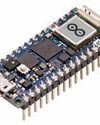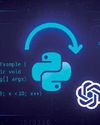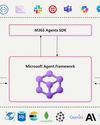يحاول ذهب - حر
How AI/ML can Automate DevOps
September 2023
|Open Source For You
AI/ML integration in DevOps can be transformative for software development. It can enable faster code development, improve the efficiency and reliability of the software, and automate the analysis of massive amounts of data.

The concept of DevOps was born with the purpose of fostering collaboration between the development and operations teams in order to streamline the software development life cycle. Numerous organisations are already reaping the benefits of DevOps. And now, AI and ML are being increasingly used in DevOps pipelines. The aim is to increase the operational efficiency and productivity. A shift towards automation can improve the overall performance of the system. In order to get optimum results, engineering teams adopt AI and ML techniques that can make maximum use of the underlying data and improve the overall DevOps experience.
Steps to include AI/ML in DevOps pipelines
By integrating AI/ML in DevOps, massive amounts of data generated in the DevOps pipeline can be analysed. Different AI/ML algorithms that suit the needs of the organisation can be applied. Here are the key steps:
Define the goal to use AI/ML in DevOps
Identify the relevant tools and technologies
Leverage cloud providers’ APIs if available
Analyse DevOps data and gather appropriate training and testing data
Correlate different sets of inputs to find the best course of action
Build and finalise the AI/ML models
هذه القصة من طبعة September 2023 من Open Source For You.
اشترك في Magzter GOLD للوصول إلى آلاف القصص المتميزة المنسقة، وأكثر من 9000 مجلة وصحيفة.
هل أنت مشترك بالفعل؟ تسجيل الدخول
المزيد من القصص من Open Source For You

Open Source For You
The Role of Open Source in Building Modern Data Infrastructure
It's no secret that open source is emerging as the backbone of modern data infrastructure. Here’s a list of the core open source technologies used to deploy this infrastructure, along with some real-world examples and a brief on why open source matters.
3 mins
December 2025

Open Source For You
The Whispering Machines: How Open Source is Bringing Intelligence to the Tiniest Devices
Built on open source frameworks, TinyML is enabling complex machine learning models to run on the microcontrollers embedded in connected devices, bringing artificial intelligence to the very edge of the network.
3 mins
December 2025

Open Source For You
Setting Up Snort to Secure Your Network
Snort is a popular, open source intrusion detection system that monitors traffic in real time to detect malware. Here’s a detailed explanation of how to set it up on Ubuntu and test it by generating traffic from another system.
7 mins
December 2025

Open Source For You
When AI Meets DevOps to Build Self-Healing Systems
Traditional DevOps, with its rule-based automation, is struggling to work effectively in today’s complex tech world. But when combined with AlOps, it can lead to IT systems that predict failures and solve issues without human intervention.
7 mins
December 2025

Open Source For You
How to Automate Java Code Modernisation
This short guide illustrates that automating Java code modernisation with Python and OpenAI API is not just possible-it's remarkably effective.
5 mins
December 2025

Open Source For You
The Quest to Build a Quantum Computer
The road to large-scale quantum computing is long and hard, with incremental advances paving the way. But the destination is in sight.
12 mins
December 2025

Open Source For You
Job Opportunities: What's Hot in the Cloud Space?
If there's one field that refuses to slow down, it's cloud computing. Even as automation and AI reshape roles, cloud adoption continues to surge. From startups deploying microservices overnight to enterprises migrating decades of legacy systems, cloud remains the engine of digital transformation. For professionals, this means one thing: skills that live in the cloud won't come down anytime soon.
2 mins
December 2025

Open Source For You
Securing Client Identity with Post-Quantum Cryptography
Here's a quick tutorial on how to build a secure, real world client-server model that establishes client identity by using CRYSTALS-Dilithium, a post-quantum cryptography algorithm.
3 mins
December 2025

Open Source For You
Unlocking the Power of Multi-Agent Solutions with the Microsoft Agentic Framework
The Microsoft Agentic Framework is rapidly emerging as a cornerstone for developers, architects, and technology leaders seeking to build dynamic, intelligent systems powered by multiple collaborating agents. In an era where automation, distributed intelligence, and adaptive software are increasingly vital, this framework offers robust tools and features to accelerate the design and deployment of agent-based solutions.
6 mins
December 2025

Open Source For You
Apache Iceberg and Trino: Powering Data Lakehouse Architecture
Apache Iceberg is a cornerstone of any open data lakehouse, providing the transactional foundation upon which highly scalable and flexible analytics can flourish. Along with Trino, it can be used to build a robust, scalable, and high-performance data lakehouse.
4 mins
December 2025
Translate
Change font size
